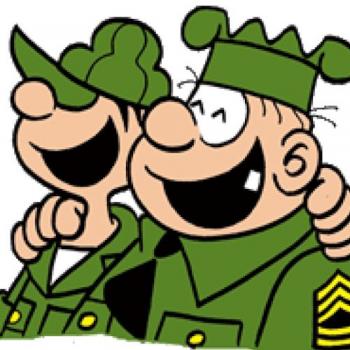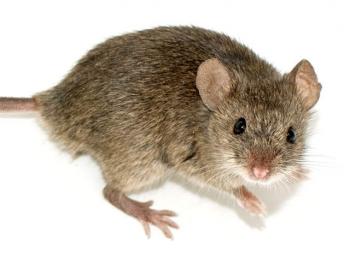Ask Professor Puzzler
Do you have a question you would like to ask Professor Puzzler? Click here to ask your question!

When I was a child, the newspaper meant one thing: comics! My brothers and I would race to see who could get the section containing the "funny pages" first. The rest of us would have to wait impatiently while the winner guffawed over the antics of Beetle Bailey, Nancy, Andy Capp, and many others.
As I grew older, I started to get more curious about what was going on in the world (read my previous blog post about sixth grade to find out why I got interested in current events), and so I began to look at the first section of the paper to see what the news headlines were, and maybe read a story or two. I might start in reading a story about a hostage situation on page one, and when I'd get to the end of the column of print, I'd see a bold line of text that read: "See HOSTAGES, Page 8". Dutifully, I would flip to the end of the section to finish the story. While I was there on page eight, I would notice other news stories.
These stories were not about hostages or economics or foreign policy; they were stories about an actor who broke his leg on the set of his newest movie, or about a man who lost his dog and found him three days later in a dance club smoking a cigar and flirting with a waitress.
One thing I understood without having to be told: the page one stories were important news, and the page eight stories, while they might be interesting, were just fluff. They were human interest stories that might catch my curiosity, but they didn't have any broader implications than that. The dog in the dance club was not going to significantly affect my life, or the life of anyone else except the dog's owner - and maybe the dance club owner and employees.
Sometimes those page-eight stories would creep onto the first page; there would be a column that devoted an inch or two to a page-eight story, followed by, "See DANCE DOG, Page 8". But these column inches were always below the fold, and I knew before I started that it was actually a page-eight story, even though it started on page one.
I didn't think about it at the time, but I was putting trust in the journalistic integrity and capability of the people who organized the articles in the newspaper. I was trusting that the most important stories would show up above the fold on page one. The corrolary to that was, if I never got around to reading page eight, it wouldn't really matter.
These days, a very large chunk of the population doesn't read print newspapers (including myself). And for people who read news online, there is no such thing as a Page-Eight Story, because the internet isn't organized into pages in the same way that a print newspaper is. There is no page one, page two, page three, etc. There is only "the home page" and "all the other pages." So how do news sites indicate which stories they think are most important?

Web development has stolen terminology from newspapers; just like a newspaper, we talk about content being "above the fold" or "below the fold." Of course, a website doesn't have actual folds, but when we say "above the fold," we're talking about content that is visible immediately, without scrolling. Content that is below the fold is content which you can't see without scrolling downward.
For example, to use a major news site - The New York Times - when I visited their home page yesterday, the above-the-fold story was about US relations with North Korea. The story about everyone waiting for a giraffe to give birth on live camera was below the fold. In fact, it was way below the fold. I had to scroll down at least three full pages to find it.
Last week, while the above-the-fold story was about Mosul, if you wanted to read about people going bananas over Kellyanne Conway putting her feet up on the Oval Office sofa, you had to go well below the fold to get it.
This is what I expect to see. Mosul and Korea are page one stories. Giraffes and Kellyanne's feet are page eight stories. Bravo, NYT! In my opinion, you did your job, and you did it well.
So why is this a eulogy for the page-eight story, if it still exists, just in a different form?

Because the page-eight story has been murdered. It has been brutally butchered and left for dead, dragged unceremoniously onto the front page, like the dead mouse your cat dragged in from the outdoors and plopped onto the sofa. The culprit in this vicious homicide is not the mainstream media. The culprit is you, and the culprit is me. We are all the perpetrators of this heinous crime. You probably didn't realize it, but you need to realize it, so you can stop perpetrating it.
Let me explain. Did you realize that most people don't care what's happening in Korea? Or Mosul? Most people would rather talk about feet on sofas and giraffes giving birth. These stories are the grown-up version of racing for the comic pages. So here's what happens on a daily basis:
The Newspaper Readers
The people who actually visit news websites scan through headlines, read an article here or there, and then think "My friends would like to read this story, so I'm going to share it on social media." But which story do you think your friends want to read? The story about North Korea? Or the story about Kellyanne's feet? The answer, of course, is that most of your friends don't want to read about Korea; they want some juicy gossipy story that they can whine about and feel superior about. So you share the page-eight story instead of the page-one story. You don't think anything of it, and it never occurs to you that thousands of other people are doing exactly the same thing as you, and that you are, in effect, turning the page-eight story into a page-one story. That story is the dead mouse that your cat proudly dropped onto the sofa for everyone to see. It doesn't belong on page one. The journalists didn't put it there. You did!
The Social Media Readers
The social media readers get all their news from Facebook. So unless they've got friends who recognize a dead mouse when they see one, they know absolutely nothing about North Korea or Mosul. But they know everything about Kellyanne's feet and giraffe births. It never occurs to them that the journalists behind the story considered it a page-eight story, and hoped that you would take time to read about Mosul before you went on to lesser stories. So they read the story, find it amusing, and probably share it with their friends. So the foot story goes viral, while the North Korea story lies dormant.
The Result
Sooner or later, everyone starts asking the question, "Why is the mainstream media reporting this? This isn't news!" or "Hey! the mainstream media is trying to distract us from important stories. They're *gasp* FAKE NEWS!" In essence, we start saying, "I can't believe CNN/New York Times/Washington Post put this dead mouse on my sofa!"
Uh...NYT didn't put that there. Your friends did. And you did. You are the one who decided a below-the-fold story was more interesting and more important than an above-the-fold story. The journalists did their job, and you undid it!
We need to come to terms with the fact that news doesn't work the way it used to. In the age of social media, we are all journalists. We all make editorial decisions about what's important enough to share, and what isn't. We can't blame the "mainstream media" for bad journalistic choices when we are the ones who have made those bad choices.
Let's resurrect the concept of a page-eight story. Share thoughtful, important stories on social media, and let the below-the-fold stories be a special treat for those people who actually chew their way through the steak and potatoes of the above-the-fold news. Because the page-eight story wasn't intended to be a dead mouse; it was supposed to be a dessert for the faithful few who eat their supper. Be wise about how often you share those stories, remembering that you too are a journalist.
The choice is up to us. The newspapers have always reported page-eight stories, and they're not going to stop just because we've stopped recognizing the difference between the important and the trivial. Be a good journalist in the age of social media.


